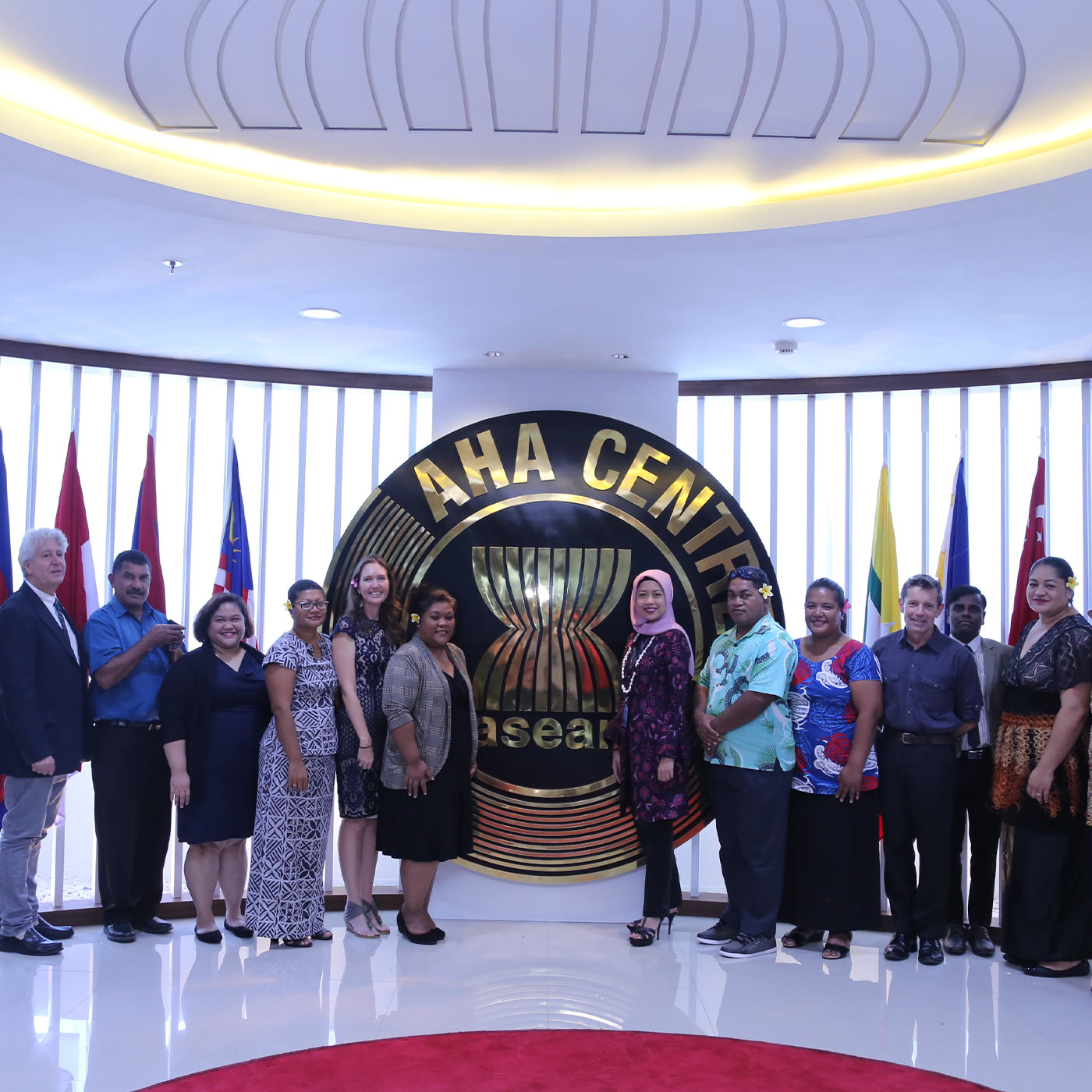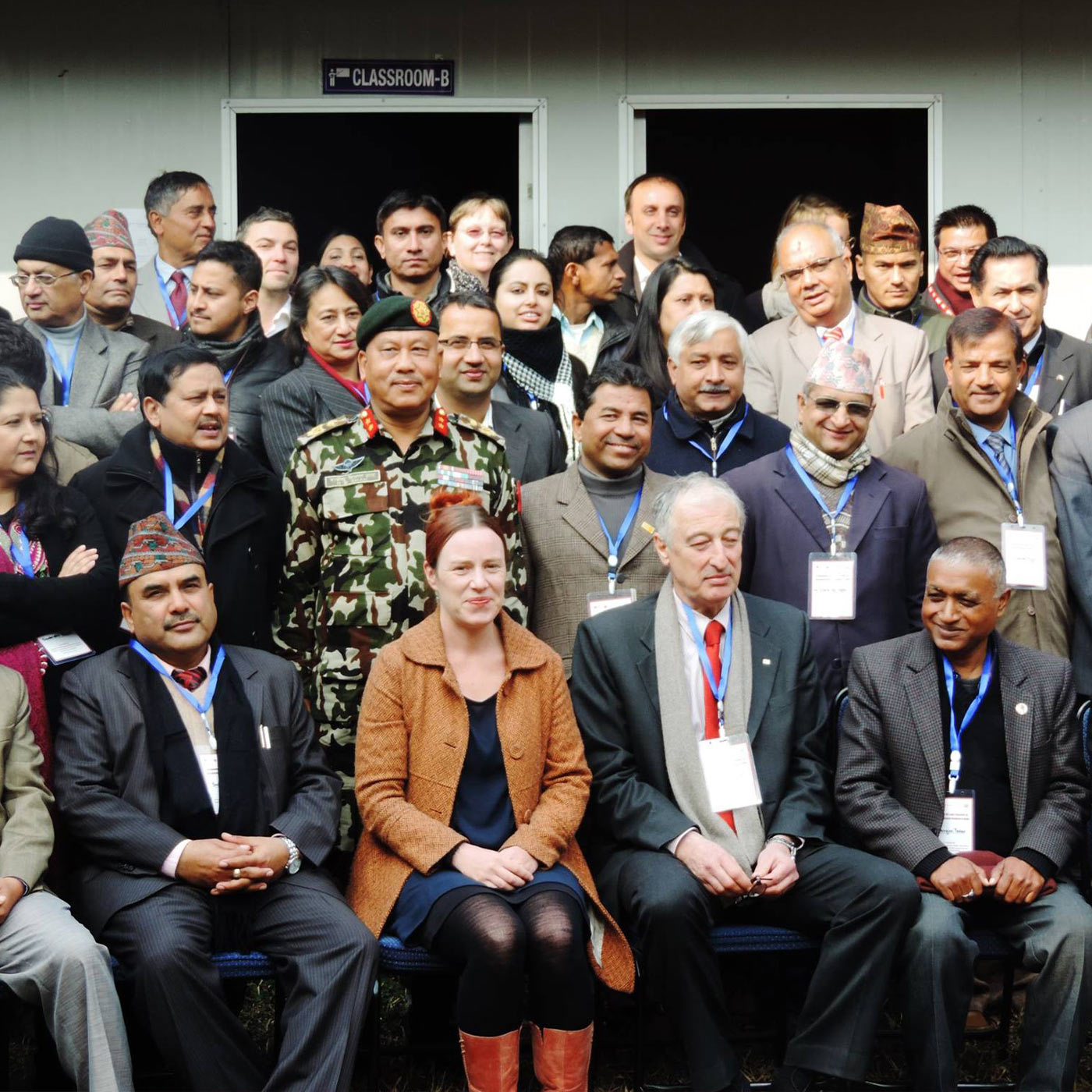Profile
At the cornerstone of crisis
Working across 38 countries in the Asia Pacific for the International Federation of Red Cross, Otago law alumna Gabrielle Emery understands the importance of legal frameworks to help in times of natural and humanitarian disasters, climate change and, now, global pandemics.
When we think of disaster relief, we don't usually think of the law. We see medical supplies, food parcels and temporary shelter. But at the eye of every storm, invisible but just as crucial in helping communities out of turmoil, is a functioning, responsive legal system.
Key to developing those systems across the Asia Pacific region, and ensuring they meet the needs of communities in times of emergency, is Otago law alumna Gabrielle Emery. For the past seven years, Emery has been the disaster law manager for the Asia Pacific regional office of the International Federation of Red Cross and Red Crescent Societies (IFRC), based in Kuala Lumpur.
In June, as the COVID-19 situation worsened in Malaysia, Emery, her husband Ricard and their three children came back to Auckland, where she continues to work remotely.
Having spent the past 15 months home-schooling in Kuala Lumpur, Emery says it was a “huge relief” to get back to New Zealand and start the two oldest children in school again. “They're very happy. You can see them buzzing and learning again which is wonderful.”
Emery first became interested in human rights and humanitarian issues while studying law at the University of Otago in the late 1990s.
“My first passion before law was actually languages. I was doing Japanese and Asian studies papers, and also Russian, and at school I'd done Spanish and German, so I was very in the language mode.
“I did law as well because it was something a little more solid and thoughtful around the languages, but the more I studied law and got into looking at the human rights dimensions and governance as a whole, that was what really interested me so that was the path I followed.”
After Otago, Emery headed to Ireland where she completed her Master of Laws in International Human Rights Law at the National University of Ireland in Galway. She then took up an internship with a human rights law network in Chennai in southern India.
Back in London, she managed an international development programme for the Royal College of General Practitioners and, in 2008, landed a job in New York as a humanitarian and development adviser for the New Zealand Ministry of Foreign Affairs and Trade.
“We've seen in COVID how the small liberties of people in a time of emergency might be impinged… So it's very very important that governments are thinking about their legal frameworks and how they work before a disaster hits them.”
“That was a super-interesting, amazing job: all-up close to three years, following all the different multilateral negotiations on humanitarian issues and resolutions that were coming up through the different committees, preparing New Zealand's positioning statements, feeding back information and intelligence to Wellington.”
After having their first child, Emery and Ricard decided it was time to come back to New Zealand. “I kind of had tunnel vision at that time that I must come home.”
From Wellington, she worked as a policy and advocacy manager for New Zealand Red Cross, focusing on international humanitarian law – the laws of war, and developing training programmes for schools and universities. She was also involved with integrating New Zealand's refugee programme into the operations of New Zealand Red Cross.
In 2014, she took up her current position with IFRC. Her initial task was to establish the strategic and operational base for the IFRC Asia Pacific Disaster Law programme.
Today, her team of four works across 38 countries, supporting national Red Cross and Red Crescent societies in their work with authorities on legal frameworks and policy reform, focusing on disaster risk management and climate change adaptation. Since the arrival of the COVID-19 pandemic, their work has broadened to include public health emergencies.
As well as legal advice and policy drafting, the team conducts research, and delivers training and advocacy plans to policymakers, parliamentarians and the humanitarian community. They also help create strategies to ensure the practical, on-the-ground application of legislative and policy reform for communities.
Since 2015, they've been involved with establishing disaster response frameworks, protection and management laws for Mongolia, Nepal, Myanmar, Nauru, Indonesia and Laos.
Unlike humanitarian law applicable in times of conflict, Emery says there is no body of international law that exists in times of natural disaster.

Gabrielle Emery (second from right) stands with representatives from Pacific governments, Red Cross societies and regional representatives together with the AHA Centre, the ASEAN Co-ordinating Centre for Humanitarian Assistance on disaster management, to conduct peer learning on regional governance for disaster risk management and climate change adaptation.
“Back in 2004, after the big Indian Ocean tsunami, there was a lot of confusion about what are the rules, how can people work together, particularly in the international community and how that relates to national systems.
“Red Cross really spearheaded that. It started doing research and developed a set of non-binding principles around this area. The [IFRC disaster law] programme grew out of that work.”
Their work varies according to need. In some countries, they are working on awareness levels and running training programmes, in others providing expert advice on legislation and drafting bills.
Sometimes, a community or local authority might not understand what their rights are and what their responsibilities are under law, so they work locally to “break down what the law is in layman's terms and get people really understanding and familiarising themselves with key concepts and key duties”.
A main focus is ensuring the needs and rights of the communities are incorporated and prioritised into the legal frameworks. “It needs to be very people-centred. People need to know what they have to do. We focus on having a very transparent, participatory way of developing those laws.”
Emery says the programme has become well known by decision-makers in the Asia Pacific region, and she finds they often reach out to ask for advice, with a high demand now coming from Pacific countries.
Another key area is providing legal, policy and advocacy support as part of a humanitarian disaster response. After the Nepal earthquake in 2015, Emery was deployed to support the Nepal government and humanitarian community to develop some policies on how the international assistance should be regulated and co-ordinated.
“Law really is the cornerstone. You need to have very effective and clear laws for everyone who is involved. They need to know what they're meant to be doing and when, who they're meant to be working with, how budgets can be allocated, how those different co-ordinating mechanisms work.
“We've seen in COVID how the small liberties of people in a time of emergency might be impinged and the importance of the safeguards of law around that. So it's very very important that governments are thinking about their legal frameworks and how they work before a disaster hits them. It's too late during a disaster because you get lots of ad hoc decision-making.”
Globally, Emery says there have never been so many laws issued for one event in such a short time.
“What we're seeing from COVID is that it's not just a public health emergency. It affects every sector, every area in a society, and there need to be better ways of working with normal systems in the country and normal emergency response mechanisms.”
She says countries need to think globally in terms of how they support each other during this time, be it with PPE supply or access to vaccines.
One positive response has been the establishment in April 2020 of the Pacific Humanitarian Pathway on COVID-19. This aims to ensure regional co-ordination in response to the pandemic and to facilitate the provision of medical and humanitarian assistance. IFRC is working with Pacific Pathway governments to “try to make sure that it is not just a political statement, but gets fully embedded into their frameworks”.
“There's no one size fits all and there's not one perfect way of doing something. I think you have to find something realistic for the country you're working with.”
With climate change, their focus is also on ensuring that whatever policies and laws are developed, particularly how we adapt to climate change, that they work together with existing disaster risk reduction initiatives. “We're making sure that those systems talk to each other. That they don't duplicate efforts or cause confusion, particularly at the community level.”
She says all laws have their part to play in reducing disaster risk, be they housing laws, planning laws or the curriculum. “It's probably some of those laws that people might not normally think of as disaster management law, but they're the laws that people really need to focus on for reducing risk.”
Unfazed by the range of tasks faced by the team and the enormous geographical area it covers, Emery says the diversity of her work is what she loves most about her job. “I love trying to find a solution for every country that's going to work for that country. There's no one size fits all and there's not one perfect way of doing something. I think you have to find something realistic for the country you're working with.”
Sometimes, however, she must accept that you can't make things progress at the pace you might like them to.
“You could invest your heart and soul into a process and do everything you possibly can, but so much of that is out of your hands at the end. I find that can be frustrating, but you also need to be able to step back and think 'well if that's going to happen, it will happen in the way it needs to for this country'.”
With the amount of travel involved, it's also a challenging role to fit around a family. Pre-pandemic, Emery would be away from home for about two weeks every month, and she is appreciating having more time with her family. “I'd spend a lot of time sitting in dingy airports. It's definitely not glamorous.”
While Zoom has had its challenges, she thinks people have adapted well and COVID-19 may have shown that jumping on planes isn't always necessary. “And I think this pandemic has got the international system also trusting and investing a lot more in all the national and local actors in those countries. By and large, they've done a remarkable job.”
The programme is already starting to see quite a lot of demand being generated out of COVID-19, as governments and practitioners start to think about what they need to be doing in the recovery, both in terms of the resilience and better legal preparedness.
“I think this will be a key focus for the next couple of years, along with the high focus which is needed on the climate emergency and the governance that's needed. There's been lots of great work done around the international frameworks and agreements, but really now, when rubber hits the road, how do you implement these commitments at the national level and local level? And that needs to start with your legal framework.”
MARGIE CLARK
For more information:
Web: disasterlaw.ifrc.org
Twitter: @Disaster_Law
Gabrielle Emery (centre) sits with non-governmental and academic stakeholders at a workshop to discuss and develop strengthened legal preparedness for international disaster assistance in Nepal, following the magnitude 7.8 earthquake in April 2015.
